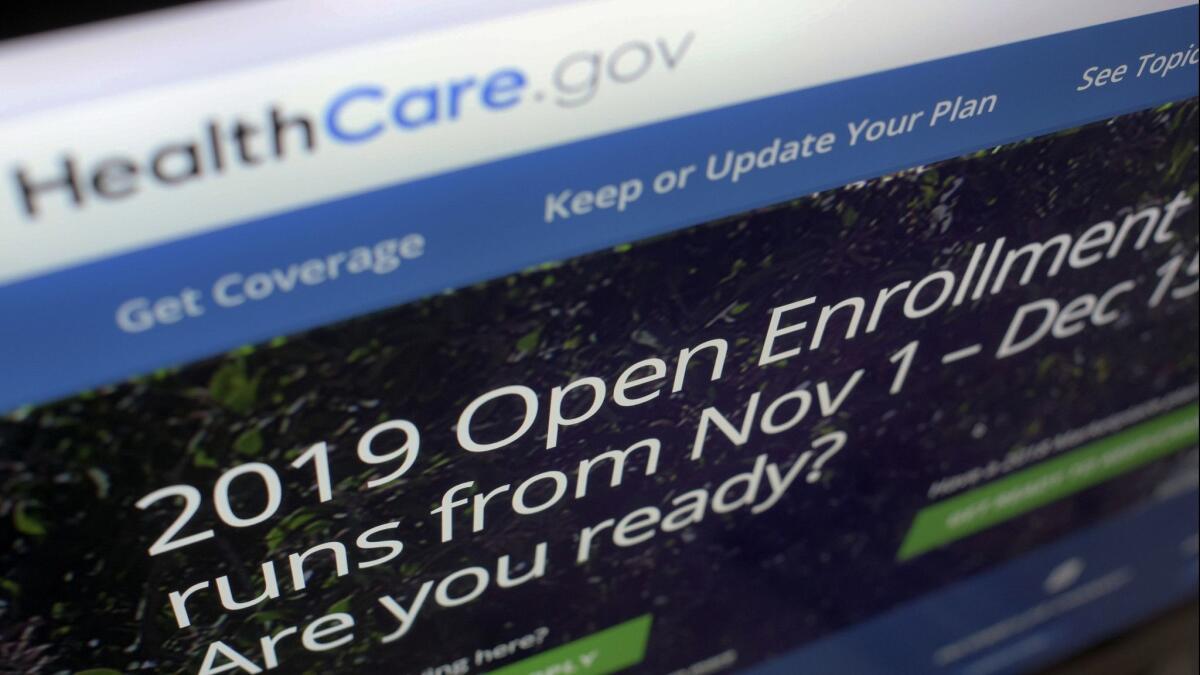Op-Ed: Obamacare may have popular features, but it’s not constitutional

Last week, after federal judge Reed O’Connor in Texas struck down the Affordable Care Act, criticism from Democratic party leaders came swiftly. It included this rebuke from Sen. Christopher Murray (D.-Conn.): “Republicans just blew up our healthcare system.”
The Trump administration, not surprisingly, lauded the decision, and predicted it would be upheld at the 5th Circuit and the U.S. Supreme Court.
So who’s right? Quite possibly, they both are.
Yes, O’Connor’s ruling exploded a healthcare system with features many Americans liked, including the coverage of preexisting conditions and a provision that allows children to stay on their parents’ policies until age 26. And yes, that healthcare system relied on an unconstitutional mandate requiring individuals to purchase insurance.
The finesse built into Obamacare in 2010 allowed Congress to avoid some difficult issues, but it relied on an unconstitutional step.
Judge O’Connor’s responsibility was to evaluate the law’s constitutionality, not its popularity. Liberal scholars have questioned his legal reasoning, and ultimately it will be the U.S. Supreme Court’s nine justices who will decide whether the ruling stands. But I believe he decided the case in a manner consistent with the Supreme Court’s 2012 opinion that first upheld Obamacare, a decision that received great praise from Democratic political leaders at the time.
In 2012, five justices signed on to opinions stating that Congress could not force private parties to buy insurance, because in so doing the federal government was creating commerce. The Constitution, they said, didn’t grant Congress the power to create commerce, only to regulate it. One of those five, John G. Roberts Jr., ruled that Congress did, however, have the right to impose a tax on all Americans who did not purchase insurance, which saved Obama’s healthcare plan. But since that ruling, Congress has repealed the tax, thereby removing the premise for Roberts’ crucial fifth vote upholding the constitutionality of Obamacare.
In passing the Affordable Care Act, Congress punted on an issue that now has to be directly confronted. The desirable parts of the bill, such as requiring insurance companies to cover preexisting conditions, are also costly. Congressional Democrats included some taxes in the Affordable Care Act, notably on medical devices and “gold-plated” health insurance policies, but they wouldn’t take the politically risky step of paying for the entire additional cost through an increase in federal income taxes or payroll taxes.
Instead, the law tried to win buy-in from the insurance companies that would have to bear the burden of covering preexisting conditions by guaranteeing they would also have a flood of new customers who had not previously purchased policies, but now would have to do so or pay a tax. These new policyholders would be younger — and in better health — than the average current insurance customer. Health insurance companies took the deal and supported Obamacare.
Enter the Fray: First takes on the news of the minute from L.A. Times Opinion »
Without any penalty for failing to purchase insurance, it’s likely that many people will once again opt out of coverage, and five justices are on record saying that Congress can’t force them to be insured.
In O’Connor’s view, without the tax on those who don’t buy insurance, the requirement that insurance companies cover preexisting conditions was no longer legal. As a matter of practicality, even if his ruling doesn’t stand, the effect will be the same because of Congress removing the tax. The original device of Obamacare to avoid having insurance companies or the federal government absorb the massive cost of covering preexisting health conditions is now in shreds.
The finesse built into Obamacare in 2010 allowed Congress to avoid some difficult issues, but it relied on an unconstitutional step. Now our elected representatives will finally have to answer the two questions they dodged in passing the Affordable Care Act: How much health insurance do we want, and how much are we willing to pay for it in taxes?
Tom Campbell is a professor of law and economics at Chapman University. He served five terms in the U.S. Congress. In 2016, he left the Republican Party and is now an independent.
More to Read
A cure for the common opinion
Get thought-provoking perspectives with our weekly newsletter.
You may occasionally receive promotional content from the Los Angeles Times.






